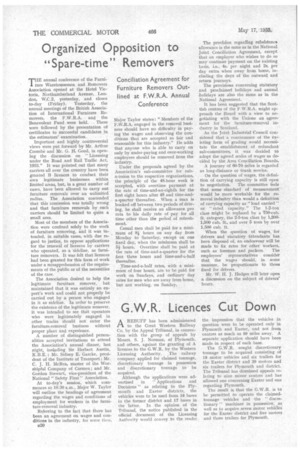Organized Opposition to "Spare-time" Removers
Page 30

If you've noticed an error in this article please click here to report it so we can fix it.
THE annual conference of the Furni ture Warehousemen and Removers Association opened at the Hotel Victoria, Northumberland Avenue, London, W.C.2, yesterday, and closes to-day (Friday). Yesterday, the annual meetings of the British Association of International Furniture Removers, the F.W.R.A. and the Benevolent Fund were held. . These were followed by the presentation of certificates to successful candidates in the estimators' examination. .
Important and highly controversial views were put forward by Mr. Arthur Coombe and Mr. G. H. Good, in opening the discussion on "Licensing under the Road and Rail Traffic Act, 1933." It was pointed out that many carriers all over the country have been granted B licences to conduct their own legitimate businesses within limited areas, but, in a great number of cases, have been allowed to carry out furniture removals over an unlimited radius. The Association contended that this concession was totally wrong and that furniture removals by such carriers should be limited to quite a small area.
Most of the members of the Association were confined solely to the work of furniture removing, and it was intended, in suitable cases, with due regard to justice, to oppose applications for the renewal of licences by carriers who operated, as a sideline, as furniture removers. It was felt that licences had been granted for this form of work under a misapprehension of the requirements of the public or of the necessities of the case.
The Association desired to help the legitimate furniture remover, but maintained that it was entirely an expert's work and could not properly be carried out by a person who engaged in it as sideline. In order to preserve the existence of the legitimate remover, it was intended to see that operators who were legitimately engaged in other trades should not enter the furniture-removal business without proper plant and experience.
A number of distinguished personalities accepted invitations to attend the Association's annual dinner, last night, including Sir Herbert Austin, K.B.E. ; Mr. Sidney E. Garcke, president of the Institute of Transport ; Mr. C. J. H. McRea, master of the Worshipful Company of Carmen ; and Mr. Gordon Stewart, vice-president of the National "Safety First" Association.
At to-day's session, which commences at 10.30 a.m., Major W. Taylor will outline the headings of agreement regarding the wages and conditions of employment for workers in the furniture-removal industry.
Referring to the fact that there has been an agreement on wages and conditions in the industry, for some time, B20 Major Taylor states: "Members of the F.W.R.A. engaged in the removal business should have no difficultyin paying the wages and observing the conditions that are accepted as fair and reasonable for this industry." He adds that anyone who is able to carry on only by under-paying and over-working employees should be removed from the industry.
Under the proposals agreed by the Association's sub-committee for submission to the respective organizations, the principle of the 48-hour week is accepted, with overtime payment at the rate of time-and-an-eighth for the first eight hours after 48 and time-anda-quarter thereafter. When a man is booked off between two periods of driving, he shall receive an allowance pro rata to his daily rate of pay for all time other than the period of refreshment.
Casual men shall be paid for a minimum of 84 hours on any day from Monday to Saturday, except on one fixed day, when the minimum shall be 51 hours. Overtime shall be paid at the rate of time-and-a-quarter for the first three hours and time-and-a-half thereafter.
Time-and-a-half rates, with a minimum of four hours, are to be paid for work on Sundays, and ordinary day rates for men who are away from home, but not working, on Sunday.
The provision regarding subsistence allowance is the same as in the National Joint Conciliation Agreement, except that an employer who wishes to do so may continue payment on the existing basis, i.e., 4s. per night and 2s. per day extra when away from home, including the days of the outward and return journeys.
The provisions concerning statutory and proclaimed holidays and annual .holidays are also the same as in the National Agreement It has been suggested that the Scottish centres of the F.W.R.A. might approach the Board with a view to negotiating with the Unions an agreement for the furniture-removal industry in Scotland.
As the Joint Industrial Council considered that a continuance of the existing form of grading would necessitate the establishment of redundant sub-committees, it was decided to adopt the agreed scales of wages as decided by the Area Conciliation Boards.
A journey of 60-70 miles is regarded as long-distance or trunk service.
On the question of wages, the definition of carrying capacity is still open to negotiation. The committee feels that some standard of measurement would be more workable for the removal industry than would a definition of carrying capacity as "load carried" or "rated capacity." The 1-2-ton class might be replaced by a 750-cub. ft. category, the 2-5-ton class by 1,2001,500 cub. ft., and over 5 tons by over 1,500 cub. ft.
When the question of wages for drivers and statutory ittendants has been disposed of, an endeavour will be made to fix rates for other workers, such as foremen and packers. The employees' representatives consider that the wages should, in some measure, be proportionate to those fixed for drivers.
Mr. W. H. J. Hedges will later open a discussion on the subject of drivers' hours.






















































































